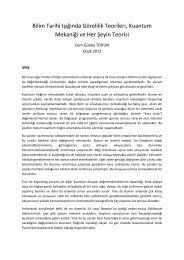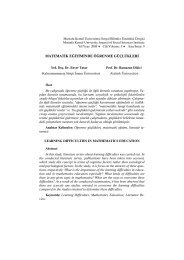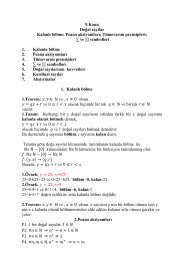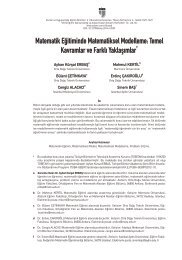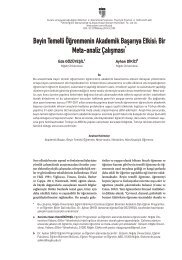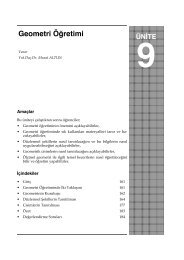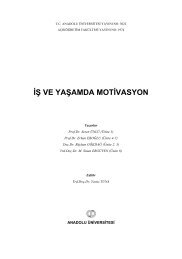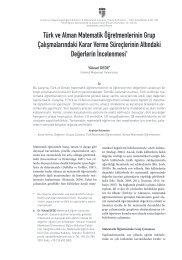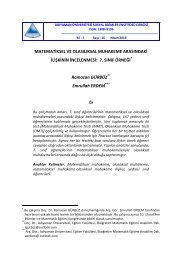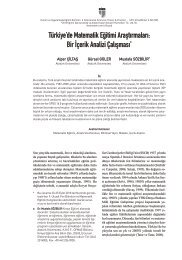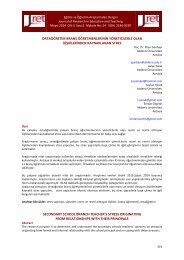NEWSLETTER
2015-12-98
2015-12-98
You also want an ePaper? Increase the reach of your titles
YUMPU automatically turns print PDFs into web optimized ePapers that Google loves.
Interview<br />
the last minute to see if he would get permission, but he<br />
didn’t.<br />
When I went back to America, I got a call from a<br />
woman claiming to be Arnol’d’s sister. I thought: “How<br />
is that possible?” I had just seen Arnol’d a few weeks before<br />
and he never mentioned he had a sister in New Jersey.<br />
She came to my office and, indeed, it was Arnol’d’s<br />
sister. He never mentioned a word. It’s incredible!<br />
Talking about Arnol’d, on some occasions he expressed<br />
frustration that results proved in the West had already<br />
been proved in Russia but, because of poor communication<br />
during the Cold War, these results were not known.<br />
Did he express these feelings to you?<br />
He tended to do that. I remember once he was visiting<br />
New York. Someone was giving a seminar talk and<br />
he was attending the lecture. During the talk, Arnol’d<br />
said: “Oh, that was already proved by such-and-such a<br />
Russian.” But the person giving the seminar talk then<br />
checked and the Russian had never proved it. So Arnol’d<br />
was not always correct. He tended to give more credit to<br />
Russians than was due.<br />
You may have heard the joke where the Russian says:<br />
“What you proved, I proved first. And anyway, the result<br />
is trivial.”<br />
Problems, collaboration and “Sitzfleisch”<br />
It is striking that 90% of your published papers describe<br />
joint work. Can you explain why this is so?<br />
It is just a pleasure! It is just an enormous pleasure talking<br />
mathematics with others and working with them. Of<br />
course, much of the work you do yourself. I mean, you<br />
discuss ideas and work with others but then you go home<br />
and think about what you have done. You get some ideas<br />
and you get together again and talk about the new ideas.<br />
You get reactions to your ideas and you react to their<br />
ideas. It is a wonderful experience.<br />
Do you usually start out with a goal in mind?<br />
Usually there is a goal. But somebody once used the expression:<br />
“There are those mathematicians who, when<br />
they come to a fork in the road, they take it.” I’m that<br />
kind of mathematician. So, I may be working on a problem<br />
with a colleague when we come to something that<br />
looks interesting, and we explore that and leave the original<br />
problem for a while.<br />
Are you more of a problem solver?<br />
Yes, definitely. There are two kinds of mathematicians.<br />
There are those who develop theories and those who are<br />
primarily problem solvers. I am of the latter.<br />
Do you come up with interesting problems through<br />
discussions with other mathematicians? What kinds of<br />
problems are you attracted to? Is there any pattern?<br />
It’s hard to say. A graduate student once asked me how<br />
I find good research problems. I said to him that I sometimes<br />
see a result but don’t like the proof. If the problem<br />
appeals to me, I start to think if there is a better proof.<br />
My ideas may lead to a better proof or may lead to something<br />
new. The student said he’d never seen a proof he<br />
didn’t like and I thought: “He is hopeless!”<br />
May we ask you a question that we have asked several<br />
previous laureates? How does one find the proof of a<br />
mathematical result?<br />
Some people work with perseverance until a proof<br />
is complete but others tell us that insight appears in a<br />
sudden flash – like lightning. Do you have experiences<br />
of this sort?<br />
Both may happen. But most of the time you are stuck.<br />
Maybe you make a breakthrough with some problem as<br />
you get some insight and see something you didn’t see<br />
before. But the perseverance and all the work you carried<br />
out before seems to be necessary to have this insight.<br />
You need perseverance or, as the Germans say, you need<br />
“Sitzfleisch”.<br />
Are you the kind of person that gets so involved in trying<br />
to solve a problem that you are, so to speak, lost to<br />
the world?<br />
Not all the time but it can happen for many hours. Sometimes,<br />
I wake in the middle of the night and start thinking<br />
about a problem for hours and cannot sleep. When you<br />
do that, it is very hard to fall asleep again! If I have an<br />
idea, I just follow it. I see if it leads to something. I still<br />
try to do that but in the last few years it has not led anywhere.<br />
I haven’t had any success.<br />
Communicating mathematics<br />
You have had 45 PhD students. That is an impressive<br />
number! Can you tell us what your philosophy is? How<br />
do you come up with problems for your students?<br />
It’s hard to say. Sometimes it is hard to think of a suitable<br />
problem. It is easier to think of problems that are too<br />
hard, and just not practical, than to think of a problem<br />
that is good and can be solved in reasonable time. I can’t<br />
really answer that question. I don’t know how I go about<br />
posing problems.<br />
Were there occasions when you had to help students<br />
along?<br />
Oh, yes. I meet the students regularly, usually once a<br />
week. We discuss their progress and I might make suggestions.<br />
I may say: “Look at this paper, this may lead to<br />
something.”<br />
How would you describe your love for mathematics?<br />
What is it about mathematics that is so appealing to<br />
you? Is it possible to communicate this love to people<br />
outside the mathematical community? Does one have to<br />
be a mathematician to appreciate the appeal of mathematics?<br />
Some people are very good at communicating to the general<br />
public. I am not so very good at that. But once you<br />
are in it, once you are hooked, it’s very exciting and fun. I<br />
have used the word “fun” before. But it is really fun to do<br />
mathematics. It is an enormous pleasure to think about<br />
EMS Newsletter December 2015 37





